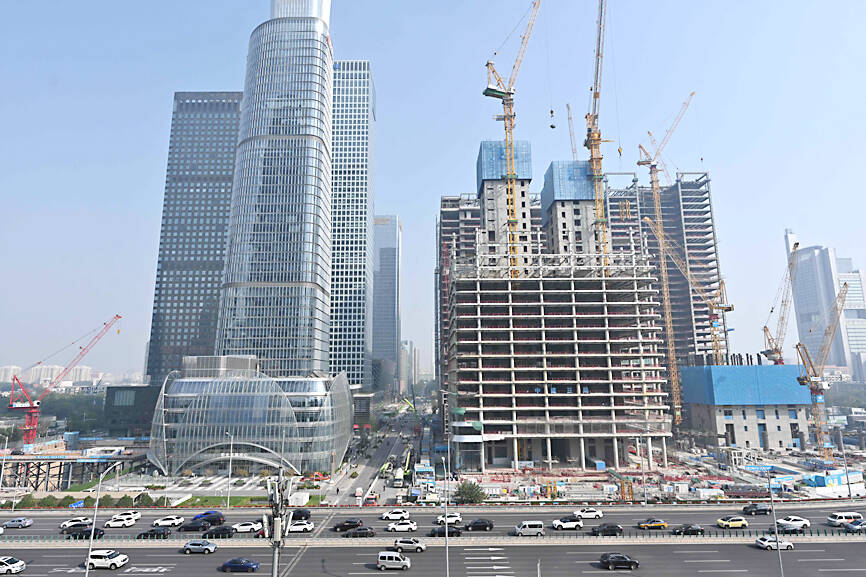China’s multiyear property crisis is set to drag on next year as prices and sales remain weak despite the government’s stimulus push to spur demand, according to Fitch Ratings.
China’s new home prices will fall by another 5 percent next year, as measured by China’s official statistics bureau, or roughly at the same pace this year, said Wang Ying (王穎), managing director at Fitch in Shanghai. Wang expects new-home sales to decline another 10 percent by area.
“The turning point for real estate sector hasn’t come yet,” Wang said. “Whether the recent warm-up can continue faces huge uncertainty.”

Photo: Adek Berry, AFP
China in the past two months unleashed its strongest package of policies to boost the property market, including cutting borrowing costs on existing mortgages, relaxing buying curbs in big cities and lowering taxes on home purchases.
The trading hub of Guangzhou became the first tier-1 city to remove all restrictions on buying residential property. Beijing, Shanghai and Shenzhen allowed more people to purchase residences in suburban areas, while letting others buy more homes.
The measures helped ease declines in China’s home prices for a second month last month. But the recovery in sales has been mostly limited to top-tier cities, and hasn’t spilled over to smaller cities, Wang said. What’s worse, prices in existing home markets have continued to decline and listings have kept piling up, suggesting the closely-watched segment in mega cities hasn’t reached its bottom, Wang added.
That will put further pressure on Chinese banks, which have been battling record low margins, sinking profits and rising bad debt from corporate borrowers. Net interest margins at Chinese banks shrank to 1.5 percent in the third quarter, the lowest in Asia Pacific, and could narrow again next year, said Vivian Xue (薛慧如), Fitch director on financial institutions.
Bad loan ratios from residential mortgages edged up by 10 to 20 basis points in recent quarters as expectations of weak income and slow delivery of finished homes damp buyers’ willingness on mortgage repayments, Xue said.
China is also facing economic headwinds as Donald Trump moves into office next year. Investors expect Beijing to roll out more stimulus policies to offset damages brought on by any additional tariffs. The country’s growth could fall by as much as two percentage points should Trump follow through on his plan to raise import taxes to 60 percent for Chinese goods, economists at Standard Chartered PLC and Macquarie Group Ltd have said.
This month, China unveiled a 10 trillion yuan (US$1.38 trillion) program to help resolve its local government debt crisis. But Davis Sun (孫浩), a senior director at Fitch, is taking a “cautious view” on how effective the package will be, adding that some local government financing vehicles might label themselves differently to circumvent restrictions from taking on more hidden debt.

Intel Corp chief executive officer Lip-Bu Tan (陳立武) is expected to meet with Taiwanese suppliers next month in conjunction with the opening of the Computex Taipei trade show, supply chain sources said on Monday. The visit, the first for Tan to Taiwan since assuming his new post last month, would be aimed at enhancing Intel’s ties with suppliers in Taiwan as he attempts to help turn around the struggling US chipmaker, the sources said. Tan is to hold a banquet to celebrate Intel’s 40-year presence in Taiwan before Computex opens on May 20 and invite dozens of Taiwanese suppliers to exchange views

Application-specific integrated circuit designer Faraday Technology Corp (智原) yesterday said that although revenue this quarter would decline 30 percent from last quarter, it retained its full-year forecast of revenue growth of 100 percent. The company attributed the quarterly drop to a slowdown in customers’ production of chips using Faraday’s advanced packaging technology. The company is still confident about its revenue growth this year, given its strong “design-win” — or the projects it won to help customers design their chips, Faraday president Steve Wang (王國雍) told an online earnings conference. “The design-win this year is better than we expected. We believe we will win

Chizuko Kimura has become the first female sushi chef in the world to win a Michelin star, fulfilling a promise she made to her dying husband to continue his legacy. The 54-year-old Japanese chef regained the Michelin star her late husband, Shunei Kimura, won three years ago for their Sushi Shunei restaurant in Paris. For Shunei Kimura, the star was a dream come true. However, the joy was short-lived. He died from cancer just three months later in June 2022. He was 65. The following year, the restaurant in the heart of Montmartre lost its star rating. Chizuko Kimura insisted that the new star is still down

While China’s leaders use their economic and political might to fight US President Donald Trump’s trade war “to the end,” its army of social media soldiers are embarking on a more humorous campaign online. Trump’s tariff blitz has seen Washington and Beijing impose eye-watering duties on imports from the other, fanning a standoff between the economic superpowers that has sparked global recession fears and sent markets into a tailspin. Trump says his policy is a response to years of being “ripped off” by other countries and aims to bring manufacturing to the US, forcing companies to employ US workers. However, China’s online warriors